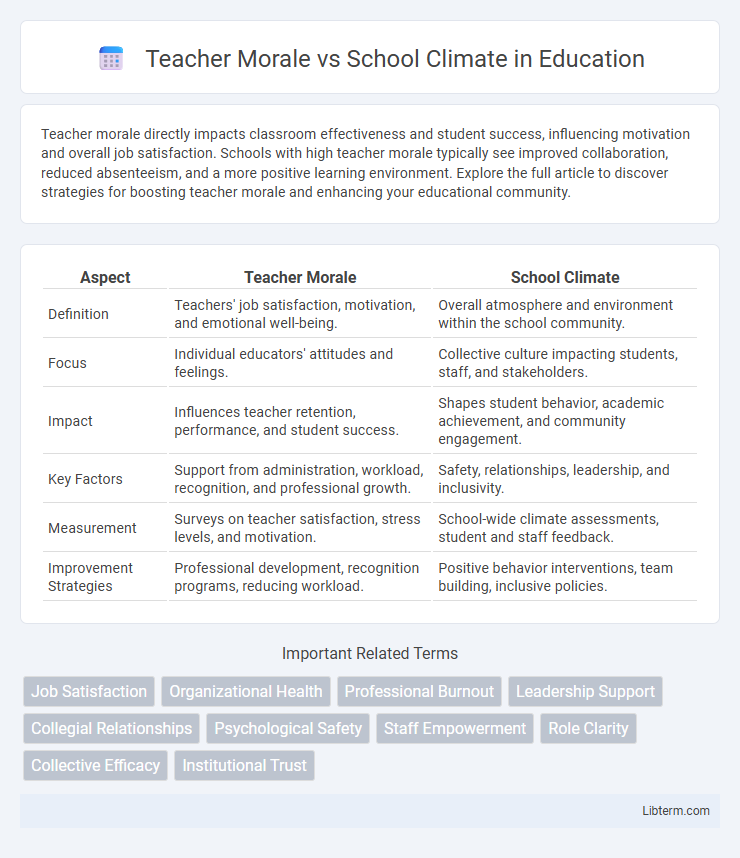Teacher morale directly impacts classroom effectiveness and student success, influencing motivation and overall job satisfaction. Schools with high teacher morale typically see improved collaboration, reduced absenteeism, and a more positive learning environment. Explore the full article to discover strategies for boosting teacher morale and enhancing your educational community.
Table of Comparison
| Aspect | Teacher Morale | School Climate |
|---|---|---|
| Definition | Teachers' job satisfaction, motivation, and emotional well-being. | Overall atmosphere and environment within the school community. |
| Focus | Individual educators' attitudes and feelings. | Collective culture impacting students, staff, and stakeholders. |
| Impact | Influences teacher retention, performance, and student success. | Shapes student behavior, academic achievement, and community engagement. |
| Key Factors | Support from administration, workload, recognition, and professional growth. | Safety, relationships, leadership, and inclusivity. |
| Measurement | Surveys on teacher satisfaction, stress levels, and motivation. | School-wide climate assessments, student and staff feedback. |
| Improvement Strategies | Professional development, recognition programs, reducing workload. | Positive behavior interventions, team building, inclusive policies. |
Understanding Teacher Morale: Definition and Importance
Teacher morale refers to educators' overall job satisfaction, motivation, and emotional well-being, directly influencing their effectiveness and retention. High teacher morale fosters a positive school climate by promoting collaboration, reducing burnout, and enhancing student achievement. Recognizing the factors that impact morale--such as administrative support, professional development, and work environment--is essential for improving educational outcomes.
Defining School Climate: Key Components
School climate encompasses the collective perceptions of safety, relationships, and the learning environment within a school, directly impacting teacher morale. Key components include physical and emotional safety, supportive teacher-student interactions, and shared norms promoting respect and inclusivity. A positive school climate fosters professional collaboration and recognition, essential for sustaining high teacher morale and enhancing overall educational outcomes.
The Interconnection between Teacher Morale and School Climate
Teacher morale directly influences and is influenced by the school climate, creating a cyclical relationship that impacts overall educational outcomes. Positive school climate fosters teacher job satisfaction, collaboration, and professional growth, which in turn elevates teacher morale. High teacher morale enhances engagement and supports a safe, respectful, and inclusive learning environment, reinforcing a constructive school climate.
Factors Influencing Teacher Morale
Teacher morale is significantly influenced by factors such as administrative support, professional development opportunities, and recognition of teacher efforts. A positive school climate characterized by mutual respect, clear communication, and collaborative culture directly enhances teacher motivation and job satisfaction. Research indicates that schools with supportive leadership and strong community engagement report higher levels of teacher morale and reduced turnover rates.
Elements that Shape School Climate
Teacher morale significantly influences school climate through elements such as leadership quality, professional support, and recognition. Positive communication channels, collaborative decision-making, and access to resources directly contribute to a supportive environment that boosts teacher motivation. Effective management of these key factors creates a resilient school culture conducive to both staff well-being and student success.
Impact of Teacher Morale on Student Outcomes
High teacher morale significantly improves student academic achievement by fostering a positive and supportive learning environment. Teachers with elevated morale are more likely to engage students effectively, implement innovative teaching strategies, and maintain classroom management, directly enhancing student motivation and performance. Research indicates schools with strong teacher morale exhibit higher student attendance rates, increased standardized test scores, and reduced behavioral issues.
School Climate’s Role in Teacher Retention
School climate, encompassing factors like safety, relationships, and support systems, plays a crucial role in teacher retention by fostering a positive and collaborative environment that enhances job satisfaction. A supportive school climate reduces teacher stress and burnout, leading to higher levels of morale and commitment among educators. Research indicates that improvements in school climate directly correlate with lower turnover rates, making it a pivotal focus area for sustaining a stable and motivated teaching workforce.
Strategies for Improving Teacher Morale
Implementing targeted strategies to improve teacher morale significantly enhances overall school climate by fostering a supportive and collaborative environment. Providing professional development opportunities, recognizing teacher achievements, and encouraging open communication channels contribute to higher job satisfaction and motivation. Prioritizing workload management and mental health resources further strengthens teacher well-being, directly influencing positive student outcomes and school performance.
Enhancing School Climate: Best Practices
Enhancing school climate significantly improves teacher morale by fostering a supportive and inclusive environment. Best practices include implementing collaborative decision-making, maintaining open communication channels, and promoting professional development opportunities. Regular recognition of teacher achievements and responsive conflict resolution also contribute to a positive and motivating school atmosphere.
Building a Positive Feedback Loop between Teacher Morale and School Climate
Elevating teacher morale significantly enhances school climate by fostering a supportive and collaborative environment where educators feel valued and motivated. Positive school climate, characterized by trust, respect, and effective communication, further reinforces teacher job satisfaction and engagement. Establishing a reciprocal feedback loop between teacher morale and school climate drives sustained improvements in educational outcomes and staff retention.
Teacher Morale Infographic

 libterm.com
libterm.com